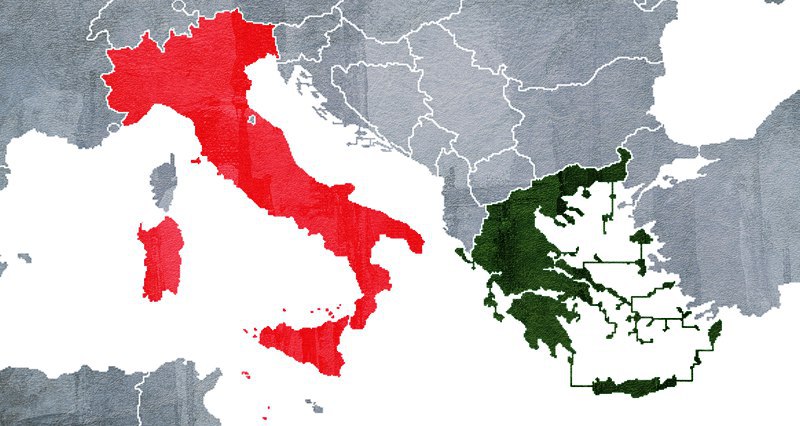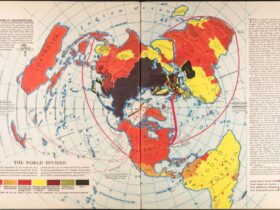The Exclusive Economic Zone Agreement signed between Greece and Italy shows that Greece has waived its claims regarding the contested islands of the Eastern Mediterranean. The agreement essentially confirms that Turkey has sea borders with Libya, Israel and Palestine.
The Greek Foreign Minister and his Italian counterpart met in Athens on July 9, and put their signatures on an agreement for the delimitation of the Exclusive Economic Zone (EEZ) in the Ionian Sea.
In the signed agreement, it is observed that the borders of continental shelves (which were accepted between the two countries in 1977) were preserved exactly and that the rights of Exclusive Economic Zone were regulated according to these borders.
In other words, according to this agreement, the Greek side has accepted coordinates that have limited influence on Greek islands, such as Diapontian (70%) and Strofades (32%), which are located just above Corfu. [1]
This approach is expected to encourage the next restriction agreements in the Aegean and the Eastern Mediterranean.
GEODESIC MAPS
Geodesic maps were used in the meeting around the agreement. This is the same methodology used by Turkey in the Eastern Mediterranean, which confirms that Turkey has sea borders with Libya, Israel and Palestine. Only the country’s neighbors in the north-south or east-west direction could be detected in Mercator maps. In the Memorandum of Delimitation of the Maritime Jurisdiction Areas signed with Libya, Turkey used gnomonic projection and geodesic maps that calculated the world’s 1 degree angle, and made their decisions based on these projection.[2]
CRITICISMS IN ATHENS
The agreement was met by a considerable amount of criticism in Athens. Former Greek Foreign Minister Nikos Kotzias said that the New Democracy (ND) “surrendered its areas of national sovereignty without taking anything”:
”In this agreement, it is seen that the old borders planned between Greece and Italy were accepted and that Italian demands were approved. The coordinates of 1977 that had a limited impact on Greek islands such as Diapontian and Strofades were accepted. The agreement, which was signed before the International Law of the Sea in 1982, is considered valid. A limited area of influence has been left to the islands. The New Democracy government recognized the rights of a third party in the Greek maritime zone (Aegialitis) for the first time in the history of the International Law of the Sea, and initiated the process of extension of each EU member state in our maritime jurisdiction. We gave up without receiving anything in turn. There is no reason to give our rights as a dowry. This agreement undermines Greece’s general position in the region.” [3]
Retired Vice Admiral Stelios Fenekos had similar criticisms:
“Our desire to find an ally that will help us cope with our Turkish fear caused us to act in a hurry and compromise by submitting to Italian demands. We have signed an agreement to offer anything for the confrontation with Turkey. On the contrary, we trumped into the hands of third parties and unnecessarily damaged our national position.”[4]
DOES THE AGREEMENT EFFECT LIBYA AND ALBANIA?
In the Turkish press, the treaty was presented in connection to the rights of Albania and Libya. According to the information I received from the Albanian Navy:
* The controversial region between Albania and Greece was not dealt in the agreement.
* Greece brought forth this agreement as a move against Turkey.
* The talks which restarted in 2018 between Albania and Greece have been largely stopped.
* Greece’s only effort is to agree with Egypt.
Likewise, Libya, by agreement with Malta in 2005, declared its Exclusive Economic Zone and registered it with the United Nations. [5]
Therefore, it is widely believed that after the agreement, Greece plans to change the balance in the Eastern Mediterranean by coming to terms with Egypt and the Greek Cypriot Administration of Southern Cyprus. How would this be possible?
GREECE’S DEAD-END
In order to sign a similar agreement with Egypt, Greece must first draw the lines of Crete, Kerpe, Kaşot, Rodos and Meis. Athens’ thesis regarding these islands is not accepted by Cairo. According to the Egyptian intelligence reports published by Al Jazeera, President al-Sisi was informed that they would suffer great losses from such an agreement with Greece. If Greece signs an agreement with Egypt renouncing its islands as a move against Turkey, Athens would be admitting they have no claim to them.

INFLUENCE OVER THE ISLANDS IS A PIPE DREAM
Greece’s theses granting it total control over the islands in the Aegean and the Eastern Mediterranean are incompatible with international law. The idea has already been rejected 17 times in the International Court of Justice (ICJ).
For example, in a similar case between Ukraine and Romania, Serpents Island, which is affiliated with Ukraine, was not included in the continental shelf and delimitation of the Exclusive Economic Zone between the two countries. [6] In the decision made by the ICJ, the main reason not to include Serpents Island was in order “not to reshape the geography”. Romania’s proposal that “Serpents Island can only have 12-mile territorial waters and cannot be used as the main point while drawing the border line” was accepted.
This decision also referred to another decision on the delimitation of the continental shelf between Libya and Malta. Regarding the importance of Filfla Island, which is affiliated with Malta, it was stated that: “The continental shelf area off of, and dividing, opposite States, can be claimed by each of them to be a natural prolongation of its territory. These prolongations meet and overlap, and can therefore only be delimited by means of a median line; and, ignoring the presence of islets, rocks and minor coastal projections, the disproportionally distorting effect of which can be eliminated by other means, such a line must effect an equal division of the particular area involved.” (I.C.J. Reports 1969, p. 36, para. 57.) It was decided that Filfla Island would not be taken into account in the drawing of the temporary middle line between Malta and Libya and had no effect on the delimitation in question.
The decision of the court was referred to in a case between Qatar and Bahrain regarding the Qit’at Jaradah Island.
GREECE’S SECOND THESIS
Although Greece has lost ground regarding its claims for full influence to the islands by agreeing with Italy, it is still attempting to expand its borders in the Eastern Mediterranean by presenting a second thesis. In the United Nations Convention on the Law of the Sea (UNCLOS) in 1982, the legal status of the archipelago was determined differently from the islands. In other words, Greece, who claims that Meis, Karaada and Fener Island is an archipelago, claims that there is a maritime zone originating among these three islands. The South China Sea Arbitration Case[8] is an effort to usurp approximately 100 thousand square kilometers of maritime zone of Turkey.[7]
Article 121/3 of the UNCLOS says that rock-status sites cannot produce EEZ agreements regarding the continental shelf. In order to become an island, a resident population must exist and have its own economy. Accordingly, Greece is initiating a settlement policy and placing people on these islands. However, in the South China Sea Arbitration Case, the Arbitration Court stated that the main thing was the island’s natural state before the modification. In other words, it is not possible for these rocks, which cannot produce their own economy and have a population of 9 people brought in from outside, to form an archipelago.
THE ISLANDS DO NOT BELONG TO GREECE
Ownership of many of the islands that Greece mentioned is still controversial. For example, together with Meis Island, 13 islands and related islets in the Menteşe Islands region were handed down to Italy by the mention of their names in the Treaty of Lausanne. Karaada and Fener Island, two other detached islands in the region, were not subject to the transfer of sovereignty in Lausanne. On January 4, 1932, the sovereignty of Karaada and Fener Island was handed down to Italy following agreement between Turkey and Italy. After the Paris Peace Treaty in 1947, Italians left the island to Greece’s sovereignty, which had been transferred to them by Turkey in Lausanne. However, during this period, no reference was made to the convention between Turkey and Italy in 1932. In other words, the islands next to Meis were transferred unlawfully, unilaterally expanding Lausanne, without the consent of Turkey, who was not among the contracting states of the Paris Peace Treaty. Besides, the “adjacent islets” of Meis mentioned in the Paris Peace Treaty were not concretely stated in either the treaty text or the attached maps.
Likewise, sovereign rights in 80% of Crete have not been transferred to Greece in any way. [9]
GREECE’S LAST ATTEMPT
Greece’s grab for Meis will likely take them to the International Court of Justice with Egypt. Retired Vice Admiral Stelios Fenekos explains the situation:
”If Egypt has objections to Meis, let’s go to The International Court of Justice in Hague with Cyprus to resolve the dispute. Therefore, perhaps, Turkey will be forced to accept responsibility and to request to participate in this, even not for all issues in the Aegean and Eastern Mediterranean. However, the International Court of Justice may not recognize our full influence over Meis. In the areas of sovereignty rights endorsed by the International Court of Justice, we can continue research and extraction of mines without the tyranny of the Turks.” [10]
It is understood that Greece, which previously stated that it did not recognize the decisions of Hague, has withdrawn its position and wants to operate at least in limited areas to be determined by the ICJ. The writer of Kathimerini, Stefanos Kasimatis, narrates the most obvious reason for this:
”The headlines of the latest statements of Turkish Minister of National Defense publicized by our media were ‘provoking’. Apparently, when Akar (the Turkish Minister of National Defense) claimed that Greece’s engaging in a military conflict with Turkey ‘was not mathematically appropriate’, most of us thought that he was provoking us. I understand this anger very well, because, unfortunately, Akar is right and we understand this truth despite our patriotism.”
[1] https://www.militaire.gr/oi-syntetagmenes-tis-symfonias-elladas-italias/
[2] https://mavivatangunlukleri.blogspot.com/2019/12/dogu-akdenizde-dunya-yuvarlak-diyebilmek.html
[4] https://www.aydinlik.com.tr/bir-yunan-amiral-in-hezeyanlari-210409#1
[5] https://www.marineregions.org/documents/bulletin59e.pdf
[7] https://www.aydinlik.com.tr/rumlarin-istekleri-hukuktan-yoksun-turkiye-mart-2018
[8] http://static.dergipark.org.tr/article-download/bb17/cc72/db6a/5ced10b3d26f9.pdf
[9] https://www.sozcu.com.tr/2017/gundem/girit-adasinin-dortte-ucu-turkiyeye-aittir-2121425/
[10] https://www.aydinlik.com.tr/bir-yunan-amiral-in-hezeyanlari-210409#2

















Leave a Reply